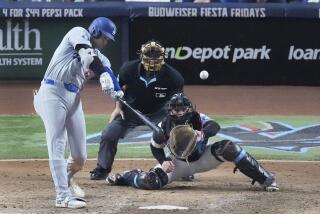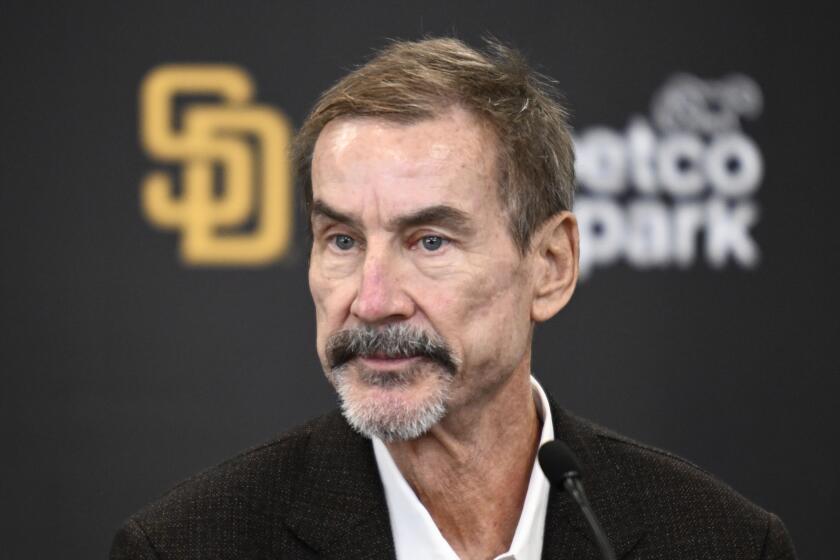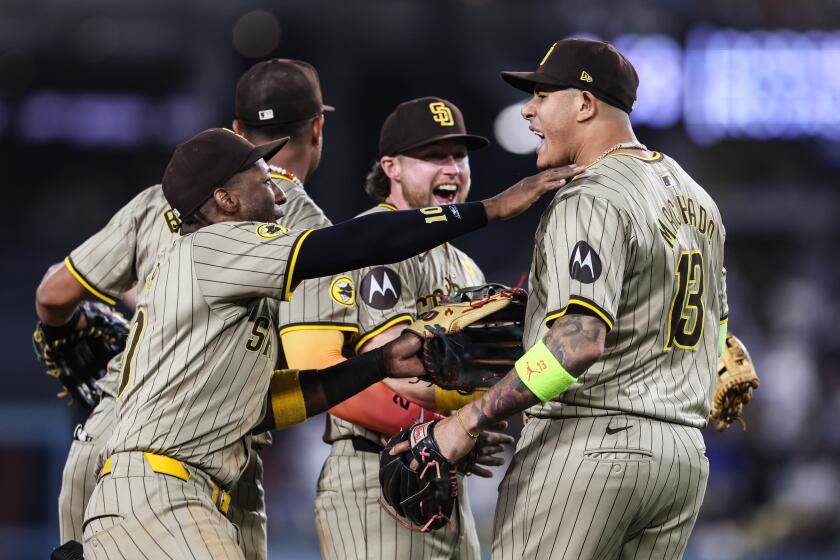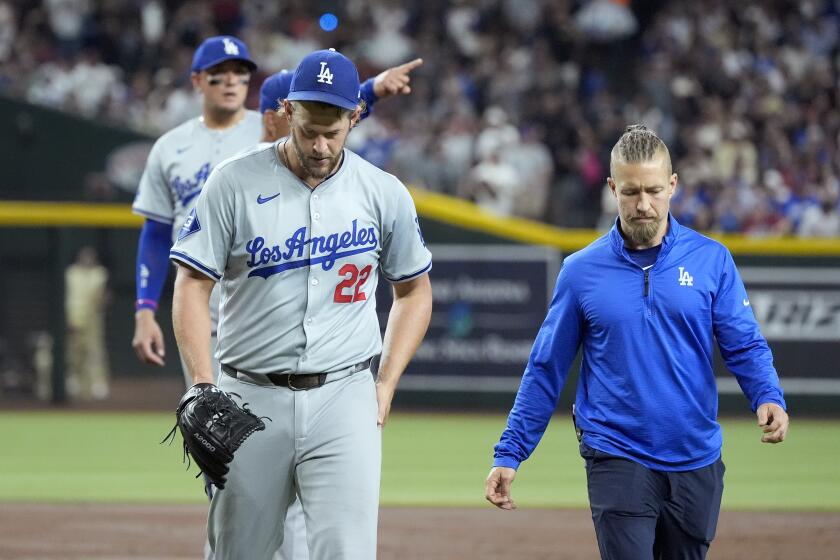Game, Again, Is on the Line for Dodgers
The worst defeat in Dodger history?
If you think the worst defeat in Dodger baseball history was delivered by Carl Hubbell, Dizzy Dean, the hated Giants, Casey Stengel’s Yankees, Whitey Ford, Jack Clark, the home run by Bobby Thomson in 1951, the dropped third strike by Mickey Owen or the three home runs Reggie Jackson hit in the sixth game of the 1977 World Series, you just may have to guess again.
The worst defeat in Dodger history might have been inflicted by a pitcher, with pinpoint control and good command of all his pitches, named Ted Koppel. Don’t look for Ted in “Who’s Who in Professional Baseball.” He has no known record for balls and strikes or innings pitched. But he knows how to set up a hitter, and he struck out the general manager of the Dodgers with, you might say, the bases loaded and the game on the line about a year ago.
It was by all odds the most damaging strikeout in Dodger history. Even the one where Owen dropped the third strike in the 1941 World Series did not do the damage Koppel did when he changed up on Al Campanis.
It’s one thing to beat the Dodgers on the field. It’s another to tamper with their hard-won image as the team that brought baseball into the 20th Century.
You see, long before the Dallas Cowboys, the Dodgers were America’s team, the darling of the intellectuals, the favorites of every man who hated bigotry and prejudice, the champions of liberty and American ideals, the guys who buried Jim Crow.
When Koppel got Campanis to chase a curveball in the dirt, the Dodgers lost more than a pennant. They almost lost their place in history. They seemed to have taken baseball back to Uncle Tom’s Cabin, exposed a whole industry to obloquy.
No one was more stunned than the owner of the Dodgers, the inheritor not only of the ballteam but the reservoir of good will and public weal that went with it. The Dodger constituency was in jeopardy. As custodian of that legacy, Peter O’Malley was mortified.
Peter O’Malley is not George Steinbrenner. He’s not even Gussie Busch. Peter O’Malley’s roots come from baseball, his money comes from baseball, his life has been baseball.
He’s not using a team to huckster beer and it’s not a hobby. He doesn’t care if he gets his picture in the paper, his name on the air. He never goes anywhere in an entourage. He never has six guys opening doors for him, lighting his cigarettes. You see him around the Dodger camp here, he’s riding a bike--or reading a report--alone.
He’s a three-piece-suit guy, but even his leisure clothes don’t have “Dodgers” stenciled on them. A wayfarer stopped him one day for directions and, when Peter politely gave them to him, the tourist asked, “Is he with the Dodgers?” and the answer came back, “In a way. He owns the Dodgers.”
He goes down to the locker room only when the Dodgers win a World Series and network television and the commissioner demand it.
The team media guides like to put the ownership up front. You can bet George M. Steinbrenner III leads off the Yankee bios. Marge Schott heads Cincinnati’s. Joan Kroc leads off San Diego’s. John Madigan, chairman of the board of the Chicago Tribune, precedes the rest of the Chicago Cubs.
Peter O’Malley is on page 88 of the Dodger guide.
He’s not a closet owner. He just inherited a smooth-running organization with impeccable credentials in the community, he was groomed for the job since birth, and, if it wasn’t broke, why fix it?
Until the Campanis affair landed on his doorstep like a load of compost or a batch of books you hadn’t ordered.
If there was a rap against Peter O’Malley, it was not that he was a hands-off owner, it was that he was a hands-folded owner. The rumor kept surfacing O’Malley had had his fill of baseball and wanted to sell out to Borden or an oil company or Nabisco or all three. He was more interested in the Music Center than Dodger Stadium, more involved in society than sport.
It wasn’t true. Peter O’Malley spent more time at the office than the night watchman. He was watching the store. What was true was that baseball had changed and the Dodgers hadn’t. Branch Rickey was dead. A team was a public trust now and couldn’t wait the 5 to 10 years for a farm system to develop.
Only two other teams in history ever drew 3 million customers for a season even once. The Dodgers did it seven times.
You had to have a contender every year, not every decade and, for the first time in baseball history, the law made that possible. The Dodgers had chosen to ignore the encroachments the Constitution had made on the grand old game.
But, not anymore. O’Malley rolled up his sleeves and took over the bridge of his listing ship. He went from custodial owner to activist. He didn’t call for the books. As a graduate of the Wharton School of Business and Finance, he knew every entry there.
Shocked by the dead end it had led his organization into, he resisted pressure to return to the old-boy network for a successor to Campanis. He turned his team over, instead, to a trusted lieutenant whom he at least knew shared his--and the 1980s’--social philosophies.
Fred Claire had been with the Dodger organization since 1969 but his background had been in sportswriting and his specialty Chamber of Commerce lunches. It was an audacious move that ran counter to the baseball way of doing things, but O’Malley had reason to be disenchanted with baseball’s way of doing things.
He did away with the Dodger way of doing things, as well. The Dodgers’ parting with $4.5 million to sign free agent Kirk Gibson was like the parting of the Red Sea. It ran counter to every philosophy Branch Rickey had expounded.
O’Malley’s next move was more predictable. The Dodgers needed to shore up their badly tarnished race-relations focus. The team that broke the color line on the field could scarcely afford to be seen as the one perpetuating it in the front office. O’Malley hired Tommy Hawkins, a likable, highly visible member of the black community, an ex-athlete and Notre Dame graduate, as his vice president in charge of communications.
To make room for him, he had to sweep out his public relations staff, another departure from the Dodger way to play baseball. The Dodgers long had a reputation for blind, unquestioning loyalty, given and taken. Dodger employees, like English kings, were supposed to be in office for life--unless they shot the Pope or stole the receipts. Or went one-on-one with Ted Koppel.
Is the damage-control total? Have the Dodgers righted the portrait? Will they draw 3 million again, win the West? Will Branch Rickey rest easy, Jackie Robinson be still, and Lincoln verified?
The Dodgers avenged other defeats. They got even with the Yankees, they’ll get another shot at Jack Clark, they struck out Bobby Thomson the next time around. They won’t be such suckers for the in-on-the-letters breaking ball this time around. They might chase Koppel to the showers this time.
More to Read
Are you a true-blue fan?
Get our Dodgers Dugout newsletter for insights, news and much more.
You may occasionally receive promotional content from the Los Angeles Times.










